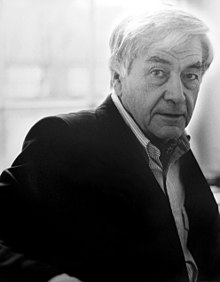|
Robert Kee
Robert Kee CBE (5 October 1919 – 11 January 2013)[1] was a British broadcaster, journalist, historian and writer, known for his historical works on World War II and Ireland. Life and careerKee was born on 5 October 1919 in Calcutta, India, to Robert and Dorothy (née Monkman). The family did well but was forced to return to Britain during the depressed early 1930s.[2] He earned a scholarship to Stowe School, Buckingham, and read history at Magdalen College, Oxford, where he was a pupil, then a friend, of the historian A.J.P. Taylor. He considered his Stowe education as having prepared him perfectly for subsequent wartime incarceration.[2] During World War II he served in the Royal Air Force as a bomber pilot. Flying the Handley Page Hampden, he was shot down by flak while on a night mine-laying mission off the coast of German-occupied Holland. He was captured and spent three years in a German POW camp. This gave him material for his first book, A Crowd Is Not Company. It was first published as a novel in 1947, but was later revealed to be an autobiography. It recounts his experiences as a prisoner of war and his various escapes from the Nazi camp. The Times describes it as "arguably the best POW book ever written."[citation needed] His career in journalism began immediately after the Second World War. He worked for the Picture Post, then became a special correspondent for The Sunday Times and, later, The Observer. He was also literary editor of The Spectator. In 1948, Kee co-founded publishing house MacGibbon & Kee with James MacGibbon[3][4] and married Janetta Woolley. In 1949 Kee and Janetta were witnesses at the marriage of their friend George Orwell to Sonia Brownell. That same year his daughter Georgiana was born. In 1958, he moved into television. He appeared for many years on both the BBC and ITV as a reporter, interviewer and presenter. He presented many current affairs programmes, including Panorama, ITN's First Report and Channel 4's Seven Days. MacGibbon & Kee was bought by Granada in 1968.[5] He was awarded the BAFTA Richard Dimbleby Award in 1976. Kee wrote and presented the documentary series Ireland – A Television History in 1980. The work was shown both in the United Kingdom and the United States and won the Christopher Ewart-Biggs Memorial Prize. Following the series' transmission on RTÉ, the Irish national broadcaster, Kee won a Jacob's Award for his script and presentation.[6] He was involved in the launch of TV-am in 1983 as one of the "Famous Five", along with David Frost, Anna Ford, Michael Parkinson and Angela Rippon. Kee was also among those who successfully campaigned for the release of the Guildford Four, the Maguire Seven and the Birmingham Six. Works
References
External links |
||||||||||||||||||
